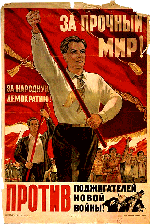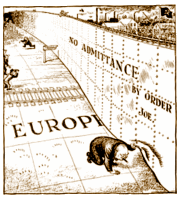Being born in early December 1941 meant that I came in at the end of the last movie just when the next one was starting. And by the time I came into awareness, there were a couple of realities that for all I knew had always been in place – the Iron Curtain and the Cold War. So we played war with plastic soldiers in the dirt, pasted newspaper clippings of the jet fighter s flying in Korea into scrapbooks, and had drills at school about how to hide from thermonuclear annihilation by getting under our desks. And except for things like the Cuban Missile Crisis, these things just faded into the background of life. And then there were signs of a thawing. In 1968, Alexander Dubçek became the President of Czechoslovakia and began to reform their Communist government, the Prague Spring. He allowed foreign travel, and my brother-in-law and his wife booked a trip, arriving a day or so before the Tanks from the Warsaw Pact invaded and put an end to Dubçek’s nonsense. After several nail-biting days holed up in a hotel, they were able to get on a train out of there.
s flying in Korea into scrapbooks, and had drills at school about how to hide from thermonuclear annihilation by getting under our desks. And except for things like the Cuban Missile Crisis, these things just faded into the background of life. And then there were signs of a thawing. In 1968, Alexander Dubçek became the President of Czechoslovakia and began to reform their Communist government, the Prague Spring. He allowed foreign travel, and my brother-in-law and his wife booked a trip, arriving a day or so before the Tanks from the Warsaw Pact invaded and put an end to Dubçek’s nonsense. After several nail-biting days holed up in a hotel, they were able to get on a train out of there.
 I don’t recall ever giving much thought to how the Iron Curtain actually worked. I’d seen the Berlin Wall and gone through Checkpoint Charlie for an afternoon. I guess I thought of it as something like that. And then one night, something remarkable happened. I had left Emory for private practice and our group [and secretary] were grossly dissatisfied with the only billing system that was available – a pegboard affair used by medical doctors. There wasn’t any billing software for a small session-based office like ours, so I set out to write some. I wrote it in dBase-III+, the language of the day. It came out better than I could’ve imagined, but to run it you had to have dBase-III+ on your [DOS] computer and it was agonizingly slow. Then a company called Clipper released a compiler that turned dBase-III+ programs into standalones that were as fast as the wind by the standards of the day. With that addition, I was beginning to sell my little program to people in the area, and I often spent my evenings on a message board Clipper had on Compuserve working out the inevitable bugs in such things. This was before the Internet. Well, the Internet was there, but Tim Berners-Lee hadn’t come up with his html language, there was no browser or world wide web, and Al Gore hadn’t invented the Information Highway [by alerting us that it was already there].
I don’t recall ever giving much thought to how the Iron Curtain actually worked. I’d seen the Berlin Wall and gone through Checkpoint Charlie for an afternoon. I guess I thought of it as something like that. And then one night, something remarkable happened. I had left Emory for private practice and our group [and secretary] were grossly dissatisfied with the only billing system that was available – a pegboard affair used by medical doctors. There wasn’t any billing software for a small session-based office like ours, so I set out to write some. I wrote it in dBase-III+, the language of the day. It came out better than I could’ve imagined, but to run it you had to have dBase-III+ on your [DOS] computer and it was agonizingly slow. Then a company called Clipper released a compiler that turned dBase-III+ programs into standalones that were as fast as the wind by the standards of the day. With that addition, I was beginning to sell my little program to people in the area, and I often spent my evenings on a message board Clipper had on Compuserve working out the inevitable bugs in such things. This was before the Internet. Well, the Internet was there, but Tim Berners-Lee hadn’t come up with his html language, there was no browser or world wide web, and Al Gore hadn’t invented the Information Highway [by alerting us that it was already there].
One night, all of a sudden, that message board lit up like a Christmas tree with entries. They were from a guy in a store-front office in Moscow who was in Russia trying to establish a Clipper presence [it was Gorbachev’s time and Russia was experimenting with perestroika – literally restructuring]. This Clipper guy was typing as fast as he could. Something was happening.  The streets were full of people. The Tanks were rolling. He thought maybe he saw Boris Yeltsin with the crowd. I yelled downstairs for my wife to turn on CNN. They didn’t know as much as I did reading this guy’s green screen messages [which went on all night]. That unrest in Moscow spread like a wildfire throughout the USSR and the rest is history. Down came the Iron Curtain.
The streets were full of people. The Tanks were rolling. He thought maybe he saw Boris Yeltsin with the crowd. I yelled downstairs for my wife to turn on CNN. They didn’t know as much as I did reading this guy’s green screen messages [which went on all night]. That unrest in Moscow spread like a wildfire throughout the USSR and the rest is history. Down came the Iron Curtain.
I think that was the first time I really understood what the term, Iron Curtain, actually meant. It wasn’t made of bricks and mortar. It was control over the free flow of information in, out, and within the USSR, and it persisted from the end of World War II until the days I’m talking about – nearly half a century. Afterwards, all kinds of explanations for why the curtain fell circulated – Reagan’s rhetoric, the Internet, etc. But that was before there were PCs everywhere using the Internet. I was later told by someone who ought to know that the real chink it the armor turned out to be the fax machines that were, by then, everywhere. As soon as things started happening in Moscow, news was flying all over the USSR on the ubiquitous fax machines. Whatever the truth, the point is that the Iron Curtain finally came down when the Soviets lost control over the flow of information.
 If you haven’t figured out the analogy I’m about to make, wipe the sleepy dust out of your eyes and think about the pharmaceutical industry’s hold on the raw clinical trial data that’s the everyday topic here and elsewhere. It’s more than just an analogy, it’s a direct application out of Stalin’s playbook for holding onto his power. By taking advantage of the low efficacy standard for FDA Approval of a drug and publishing "uncheckable" articles in the medical literature, the companies can turn a weak statistical proof of a drug’s [perhaps trivial] effect into a campaign worth billions.
If you haven’t figured out the analogy I’m about to make, wipe the sleepy dust out of your eyes and think about the pharmaceutical industry’s hold on the raw clinical trial data that’s the everyday topic here and elsewhere. It’s more than just an analogy, it’s a direct application out of Stalin’s playbook for holding onto his power. By taking advantage of the low efficacy standard for FDA Approval of a drug and publishing "uncheckable" articles in the medical literature, the companies can turn a weak statistical proof of a drug’s [perhaps trivial] effect into a campaign worth billions.
Know any good politicians?
I have a sinking feeling that the TPP is going to bury the chances for what you’re hoping for 1BOM.